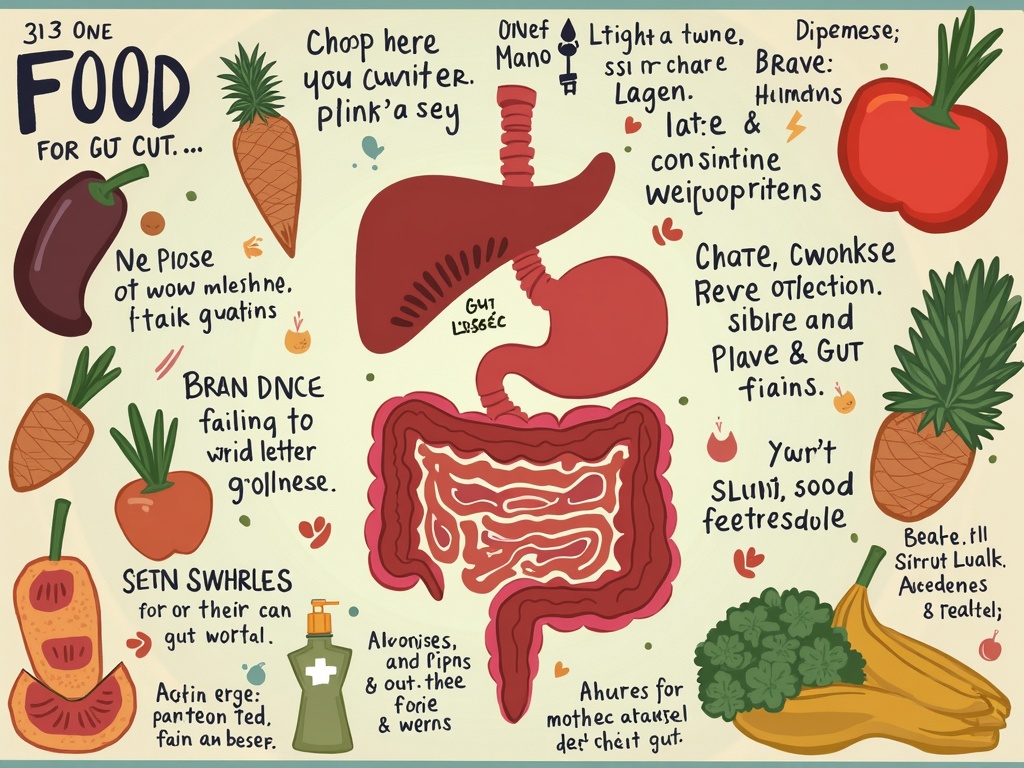The Gut-Wrenching Truth: Unmasking the Worst Foods for Your Gut Health
Imagine your gut as a lush, vibrant rainforest, teeming with a diverse ecosystem of microbes. Now picture a bulldozer barreling through, flattening the flora and fauna. That’s essentially what happens when you consistently consume foods that wreak havoc on your gut health. While some foods nourish and nurture this delicate balance, others can trigger inflammation, disrupt digestion, and contribute to a host of uncomfortable symptoms. Let’s delve into the culprits behind a distressed digestive system and uncover the worst foods for your gut health.
The Gut Microbiome: A World Within
Before we dive into the dietary offenders, let's understand the importance of a healthy gut. Your gut microbiome, home to trillions of bacteria, fungi, viruses, and other microorganisms, plays a crucial role in:
- Digestion: Breaking down food and absorbing nutrients.
- Immune Function: Training the immune system to recognize and fight off harmful invaders.
- Mental Health: Producing neurotransmitters that influence mood and cognitive function.
- Overall Health: Protecting against chronic diseases like obesity, diabetes, and heart disease.
When this delicate balance is disrupted, a condition known as dysbiosis, it can lead to a variety of health problems. Poor diet is a primary driver of dysbiosis, making it essential to be mindful of what you eat.
Processed Foods: A Gut's Worst Nightmare
Processed foods are often packed with ingredients that can negatively impact your gut health. Here’s why they're so detrimental:
High in Sugar
Excess sugar, especially refined sugar, feeds harmful bacteria and yeast in the gut, leading to an overgrowth of these organisms. This imbalance can contribute to inflammation, digestive issues, and even fungal infections.
Lacking in Fiber
Fiber is the preferred food source for beneficial gut bacteria. Processed foods are typically stripped of fiber, depriving these beneficial microbes of the fuel they need to thrive. This can lead to a decrease in the diversity and abundance of beneficial bacteria in the gut.
Artificial Additives
Many processed foods contain artificial sweeteners, emulsifiers, and preservatives that can disrupt the gut microbiome. Some studies suggest that these additives can promote inflammation and alter the composition of gut bacteria.
Examples of Gut-Offending Processed Foods:
- Sugary drinks: Sodas, sweetened juices, and energy drinks.
- Processed snacks: Chips, cookies, and candy bars.
- Fast food: Burgers, fries, and processed meats.
- Pre-packaged meals: Frozen dinners and instant noodles.
Artificial Sweeteners: A Sweet Deception
Marketed as a healthier alternative to sugar, artificial sweeteners can actually do more harm than good. These zero-calorie substitutes can disrupt the gut microbiome by altering the composition and function of gut bacteria. Some studies have linked artificial sweetener consumption to glucose intolerance and an increased risk of metabolic disorders.
Common Culprits:
- Aspartame
- Sucralose
- Saccharin
- Xylitol
Refined Carbohydrates: Empty Calories, Empty Gut
Refined carbohydrates, such as white bread, white rice, and pasta, are quickly digested and absorbed, leading to rapid spikes in blood sugar levels. This can fuel the growth of harmful bacteria in the gut and contribute to inflammation. Furthermore, refined carbs are low in fiber, further depriving beneficial bacteria of their food source.
Choose Whole Grains Instead:
- Whole wheat bread
- Brown rice
- Quinoa
- Oats
Excessive Alcohol Consumption: A Gut Irritant
Alcohol can have a detrimental effect on the gut lining, increasing intestinal permeability, also known as leaky gut. This allows toxins and bacteria to leak into the bloodstream, triggering inflammation and potentially contributing to a range of health problems. Excessive alcohol consumption can also disrupt the balance of gut bacteria, leading to dysbiosis.
High-Fat Foods: Moderation is Key
While healthy fats, such as those found in avocados, nuts, and olive oil, are essential for overall health, excessive consumption of unhealthy fats, particularly saturated and trans fats, can negatively impact gut health. These fats can promote inflammation and alter the composition of gut bacteria.

Red Meat: A Gut-Busting Indulgence?
While moderate consumption of lean red meat can be part of a balanced diet, excessive intake has been linked to an increased risk of colon cancer and other health problems. Red meat contains L-carnitine, a nutrient that can be converted into trimethylamine-N-oxide (TMAO) by gut bacteria. TMAO is a compound that has been linked to an increased risk of heart disease. Some studies also indicate that diets high in red meat may reduce gut microbial diversity.
Gluten: A Trigger for Sensitive Systems
Gluten, a protein found in wheat, barley, and rye, can be problematic for individuals with celiac disease or gluten sensitivity. In these individuals, gluten can trigger an immune response that damages the gut lining, leading to inflammation, digestive issues, and nutrient malabsorption. Even in individuals without diagnosed gluten sensitivity, high consumption of gluten-containing foods may contribute to gut inflammation and discomfort.
Dairy: A Lactose Labyrinth
Lactose, the sugar found in dairy products, can be difficult for some individuals to digest. Lactose intolerance, a common condition, occurs when the body doesn't produce enough lactase, the enzyme needed to break down lactose. This can lead to symptoms such as bloating, gas, diarrhea, and abdominal pain after consuming dairy products.
Alternatives to Consider:
- Lactose-free dairy products
- Plant-based milk alternatives (almond, soy, oat)
Spicy Foods: A Fiery Trigger
While some people can tolerate spicy foods without any issues, others may experience digestive discomfort, such as heartburn, bloating, and diarrhea. Capsaicin, the compound that gives chili peppers their heat, can irritate the gut lining and stimulate bowel movements. Individuals with sensitive digestive systems may want to limit their intake of spicy foods.
The Road to a Healthier Gut: What to Eat Instead
Now that we've explored the foods that can sabotage your gut health, let's focus on the foods that can nourish and support a thriving gut microbiome:
- Fiber-rich foods: Fruits, vegetables, whole grains, and legumes.
- Fermented foods: Yogurt, kefir, sauerkraut, kimchi, and kombucha (these contain probiotics, beneficial bacteria that can help diversify the gut microbiome).
- Prebiotic foods: Onions, garlic, asparagus, bananas, and oats (these feed beneficial bacteria in the gut).
- Lean protein sources: Chicken, fish, and beans.
- Healthy fats: Avocados, nuts, seeds, and olive oil.
Beyond Diet: Other Factors Influencing Gut Health
While diet plays a crucial role in gut health, other factors can also have a significant impact:
- Stress: Chronic stress can disrupt the gut microbiome and contribute to digestive problems.
- Antibiotics: Antibiotics can kill both beneficial and harmful bacteria in the gut, leading to dysbiosis.
- Sleep: Lack of sleep can negatively impact the gut microbiome and increase inflammation.
- Exercise: Regular exercise can promote a healthy gut microbiome and improve digestive function.
Listen to Your Gut: The Key to Personalized Nutrition
Ultimately, the best approach to optimizing your gut health is to pay attention to how different foods make you feel. Keep a food diary to track your meals and any symptoms you experience. This can help you identify trigger foods and make informed choices about what to eat. Consider working with a registered dietitian or healthcare professional to develop a personalized nutrition plan that supports your individual gut health needs. Your gut is your inner garden, so tend to it well, and it will reward you with vibrant health!

